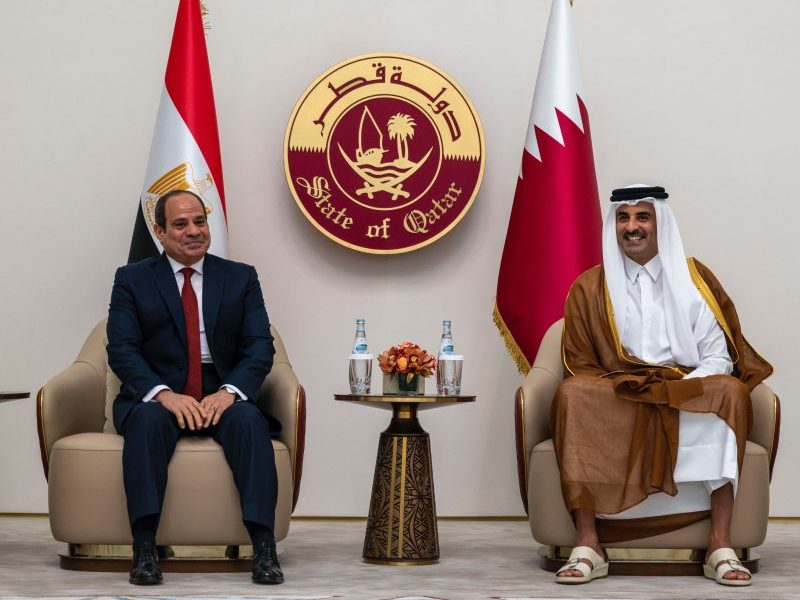Netanyahu renewed his threat to launch a ground invasion on Tuesday “with or without a deal” to achieve “total victory.”
Qatar’s Amir Sheikh Tamim bin Hamad Al Thani and Egypt’s President Abdel Fattah Al-Sisi discussed joint efforts to reach a captives’ release and ceasefire deal in Gaza over the phone on Tuesday.
“During the call, they discussed developments in the Gaza Strip and the occupied Palestinian territories, and joint mediation efforts to reach an immediate and permanent ceasefire agreement in Gaza,” the Amiri Diwan said in a statement.
The statement added that both sides discussed the release of prisoners and captives as well as “the sustainable entry of humanitarian aid into all areas of the Strip.”
Both leaders also stressed the importance of “intensifying mediation efforts during the next stage in cooperation with all regional and international partners.”
A separate readout on the call from the Egyptian presidency said both sides expressed their commitment to “protect the region from the ramifications of the expansion of the conflict.”
Qatar and Egypt have been at the forefront of mediation efforts since the beginning of Israel’s war on Gaza on October 7, 2023.
Doha has hosted the Hamas political office since 2012 following Washington’s request and does not share ties with Tel Aviv. Egypt was the first Arab country to normalise with Israel in 1979 after the Camp David Accords.
U.S. President Joe Biden also held two separate phone calls with Sheikh Tamim and President Sisi on Monday regarding the latest efforts to reach a ceasefire and captives’ release deal in Gaza.
The White House said that Biden “discussed the deal now on the table” with both leaders, without elaborating on the matter.
Qatar and Egypt mediated a truce last year that lasted between November 24 and December 1 and led to the release of at least 109 captives from Hamas in Gaza.
Blinken in the region in a push for a deal
Talks stalled since the truce expired, with Israel intensifying its genocidal war on Gaza. Nearly seven months on, Israel killed more than 34,500 people in the Strip and displaced at least 1.7 million people.
However, the talks have appeared to gain momentum this week with the visit of Hamas’s delegation to Cairo and the U.S. Secretary of State Antony Blinken’s regional tour.
Blinken’s tour, his seventh since the beginning of the war, included Saudi Arabia, Jordan and Israel.
The top U.S. official landed in Tel Aviv on Tuesday for talks with Israeli President Isaac Herzog, Israeli Prime Minister Benjamin Netanyahu, and army chief Yoav Gallant.
The visit is widely seen as another push from Washington to halt the war in Gaza, especially as Netanyahu doubles down on threats to invade Rafah.
Rafah is densely populated with more than one million people seeking shelter in fragile tents, including people forcibly displaced by Israeli forces from the north.
The invasion of Rafah would be catastrophic and leave the population with nowhere to flee other than to neighbouring Egypt.
However, Netanyahu renewed his threat to launch a ground invasion on Tuesday “with or without a deal” to achieve “total victory.”
This is despite the International Criminal Court contemplating issuing arrest warrants against senior Israeli government and military officials.
Netanyahu attempted to distort the narrative of the war and justify his actions by saying “branding Israel’s leaders and soldiers as war criminals will pour jet fuel on the fires of antisemitism.”
On Tuesday, the United Nations Secretary-General Antonio Guterres called on all sides to reach a deal.
“As negotiations are once again underway, I strongly encourage the government of Israel & the Hamas leadership to reach an agreement. For the sake of the people of Gaza. For the sake of the hostages and their families. For the sake of the region and the wider world,” he said on X.
A delegation from Hamas had arrived in Egypt on Monday for talks over a new proposal, before heading to Qatar to discuss the possible deal with the group’s members in the Gulf state.
A Hamas official told Al-Araby Al-Jadeed on Tuesday that the leadership in Gaza also studied the Israeli response and provided feedback to its officials in exile.
“Gaza’s observations on the Israeli response did not come solely from Hamas leaders, but leaders of [other] factions fighting in the Strip also participated, notably Islamic Jihad,” he said.
Several media reports have been circulating some of the updates in the latest proposal.
Israel reportedly reduced the number of captives it wants Hamas to release to 33 instead of 40, including women, elderly and those who are ill, Israeli officials told The New York Times on Monday.
One of the officials said that the change was due to Israel’s belief that some of the initial 40 captives had died. Around 130 captives are still in Gaza, including some who are believed to be dead.
The United Kingdom’s Foreign Secretary David Cameron also urged Hamas to accept a 40-day truce deal.
Some of the gaps that appeared throughout the negotiations are Israel’s rejection of a complete ceasefire and the unconditional returns of internally displaced Palestinians to the north. Israel has also repeatedly rejected Hamas’s demand to completely withdraw from Gaza.







